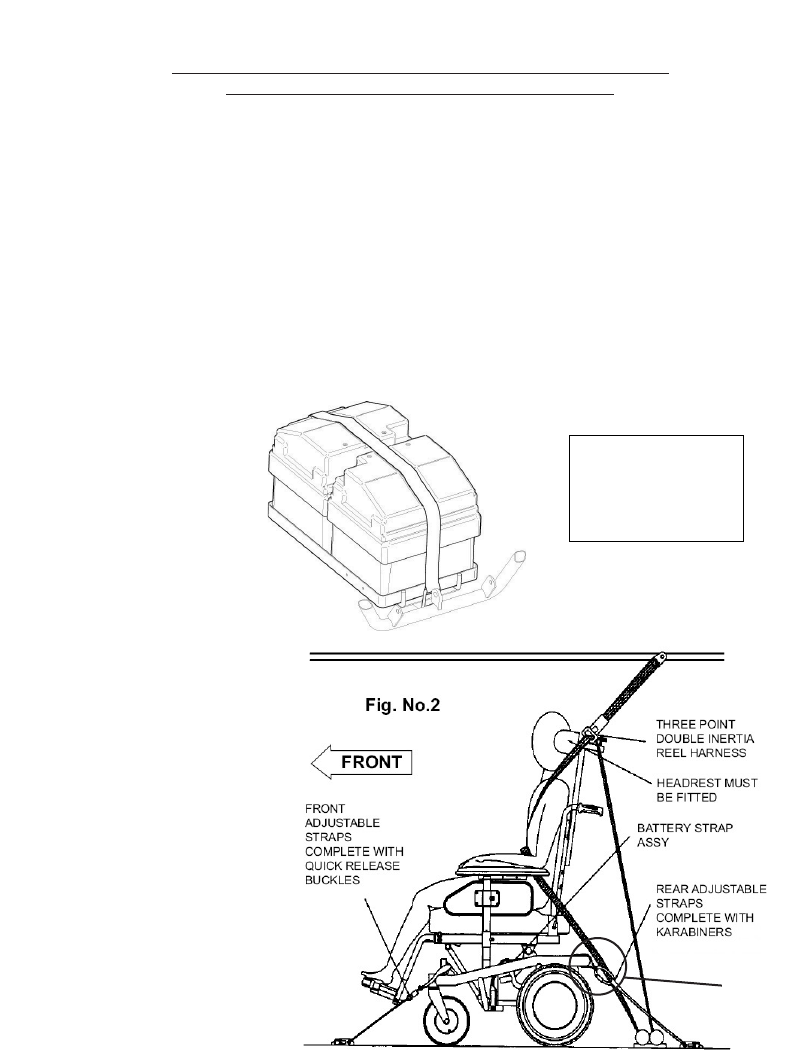
The Power chair was tested to
ISO 7176-19 using Unwins
Webbing Restraints with
Tongue and Buckle Straps. The
system comprises of front
adjustable straps complete with
quick release buckles and rear
adjustable straps complete with
karabiners and braided straps.
The straps are secured at the
specified points shown in Fig.
No.2. Both positions are
labelled “TIE DOWN POINT”.
The diagram (Fig. No.2) shows
the headrest arrangement,
which must be fitted, and the
occupant’s inertia seat belt
which also must be used.
Fig. No.2
FRONT
ADJUSTABLE
STRAPS
COMPLETE WITH
QUICK RELEASE
BUCKLES
REAR ADJUSTABLE
STRAPS
COMPLETE WITH
KARABINERS AND
BRAIDED STRAPS
THREE POINT
DOUBLE INERTIA
REEL HARNESS
HEADREST MUST
BE FITTED
BATTERY STRAP
ASSY
Fig. No.1
The restraint strap
must be tight and the
Velcro firmly
fastened.
FRONT
TRANSPORTATION OF WHEELCHAIRS IN VEHICLES
RECOMMENDED RESTRAINT METHODS
For additional information, consult your authorised Supplier.
For transportation purposes other than disassembly, the Spectra Plus may be used in vehicles which
have been modified specifically for the purpose. The power chair must be secure using these
recommended restraint methods.
• The power chairs are not designed or manufactured to be replacements for purpose built vehicle
seating.
• The occupant must be secured to the vehicle separately in addition to any wheelchair restraints.
See Fig. No. 2.
• Manually operated drive wheel locks must be used whilst the power chair is being
transported.
• Fig. No. 1. shows the route of the battery restraint strap and the position of the Velcro fastening.
The Power chair was tested to
ISO 7176-19 using Unwins
Webbing Restraints with
Tongue and Buckle Straps. The
system comprises of front
adjustable straps complete with
quick release buckles and rear
adjustable straps complete with
karabiners and braided straps.
The straps are secured at the
specified points shown in Fig.
No.2. Both positions are
labelled „TIE DOWN POINT“.
The diagram (Fig. No.2) shows
the headrest arrangement,
which must be fitted, and the
occupant’s inertia seat belt
which also must be used.
Recommended alternative headrests may be used without affecting the CE marketing of the
power chair, provided a full risk assessment has been carried out by those who have
recommended the headrest to be safe for use with the power chair.
25
See Fig No.4


















